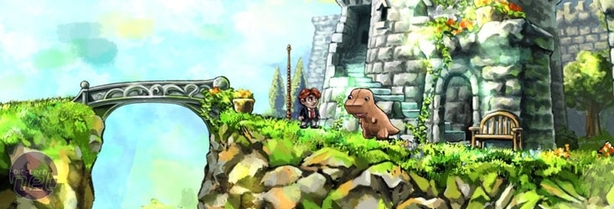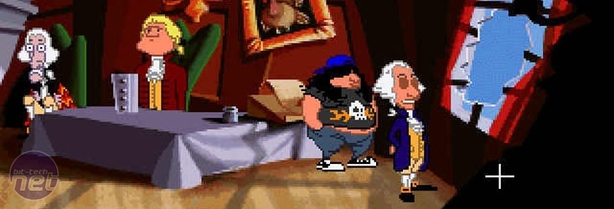Achron Interview: Your Head Will Explode
April 14, 2009 | 09:04
Companies: #hazardous-software #indie

bit-tech: How hard has it been to create the time travel mechanic from a design and development point of view? I imagine creating a UI that makes it all accessible to the player would be quite a challenge...
Chris Hazard: I’ve worked on many software projects before, from highly engineered multimillion-line systems to intricate mathematical simulations. I can easily say that creating Achron has been the most difficult thing I have ever done.
I started coding Achron after almost two years of design. Most of my initial assumptions were completely wrong, and I ended up starting from scratch about nine times before I had something that actually worked. After I got it working, I wanted to make sure I wasn’t glossing over anything that would sink the whole project.
One thing Mike and I have learned about time travel in a game engine is that it makes the easy bugs really easy to fix because you can save the game after they occur and still replay. However, the hard bugs become significantly harder. I made sure that everything was well documented and there weren’t any hacks or workarounds in the engine – if a problem in the core engine was found, it needed to be completely fixed before anything else progressed.
Regarding gameplay, there were a number of things that popped up throughout development and testing. We spent many hours discussing the various strategies players could use to exploit a particular mechanism, and many hours addressing those issues. The most important aspects with regard to balancing gameplay with time travel were chronoenergy, hierarchy controls, and the costs and limitations associated with sending units through time.
The user interface has an interesting history. Initially, we had two modes of editing and watching the past, but then we quickly found that having an additive control with undo was far more intuitive. Information on the timeline can be lumped into three categories: 1) things that are changing, 2) information that gives you a map of the past, and 3) information that tells you when you should do things. The player needs to know when opponents are, what battles were important, and when resources are available. Mike and I spent a long time debating functionality versus usability and simplicity. We’re pretty happy with the information we’ve settled on, but we are working with TC Chang, our recently hired art director, on making the timeline and user interface cleaner and more intuitive.
BT: Where did the original inspiration come from for Achron? Where did you look for ideas?
CH: Late at night in a college dorm room in 1999, I was chatting with friends about Homeworld, one of the first fully 3D RTS games. The conversation changed to speculation about what if we had a 4D RTS game, but no one could picture a good way of how it would work. I then brought up the idea of time travel. That night began two weeks of me obsessing over whether it was possible and working out the details. Over the next year and a half, I designed the game in notebooks, and then began coding.
Not long after I started coding, I brought in Mike. Initially we bounced ideas around, and eventually he took the reigns of fleshing out details of the RTS gameplay on top of the engine.
The two games that had the most influence on Achron from my perspective were Chrono Trigger and Starcraft. Mike was a fan of time travel from the Terminator movies, as well as an avid RTS player.
Chris Hazard: I’ve worked on many software projects before, from highly engineered multimillion-line systems to intricate mathematical simulations. I can easily say that creating Achron has been the most difficult thing I have ever done.
I started coding Achron after almost two years of design. Most of my initial assumptions were completely wrong, and I ended up starting from scratch about nine times before I had something that actually worked. After I got it working, I wanted to make sure I wasn’t glossing over anything that would sink the whole project.
One thing Mike and I have learned about time travel in a game engine is that it makes the easy bugs really easy to fix because you can save the game after they occur and still replay. However, the hard bugs become significantly harder. I made sure that everything was well documented and there weren’t any hacks or workarounds in the engine – if a problem in the core engine was found, it needed to be completely fixed before anything else progressed.
Regarding gameplay, there were a number of things that popped up throughout development and testing. We spent many hours discussing the various strategies players could use to exploit a particular mechanism, and many hours addressing those issues. The most important aspects with regard to balancing gameplay with time travel were chronoenergy, hierarchy controls, and the costs and limitations associated with sending units through time.
The user interface has an interesting history. Initially, we had two modes of editing and watching the past, but then we quickly found that having an additive control with undo was far more intuitive. Information on the timeline can be lumped into three categories: 1) things that are changing, 2) information that gives you a map of the past, and 3) information that tells you when you should do things. The player needs to know when opponents are, what battles were important, and when resources are available. Mike and I spent a long time debating functionality versus usability and simplicity. We’re pretty happy with the information we’ve settled on, but we are working with TC Chang, our recently hired art director, on making the timeline and user interface cleaner and more intuitive.
BT: Where did the original inspiration come from for Achron? Where did you look for ideas?
CH: Late at night in a college dorm room in 1999, I was chatting with friends about Homeworld, one of the first fully 3D RTS games. The conversation changed to speculation about what if we had a 4D RTS game, but no one could picture a good way of how it would work. I then brought up the idea of time travel. That night began two weeks of me obsessing over whether it was possible and working out the details. Over the next year and a half, I designed the game in notebooks, and then began coding.
Not long after I started coding, I brought in Mike. Initially we bounced ideas around, and eventually he took the reigns of fleshing out details of the RTS gameplay on top of the engine.
The two games that had the most influence on Achron from my perspective were Chrono Trigger and Starcraft. Mike was a fan of time travel from the Terminator movies, as well as an avid RTS player.

MSI MPG Velox 100R Chassis Review
October 14 2021 | 15:04











Want to comment? Please log in.